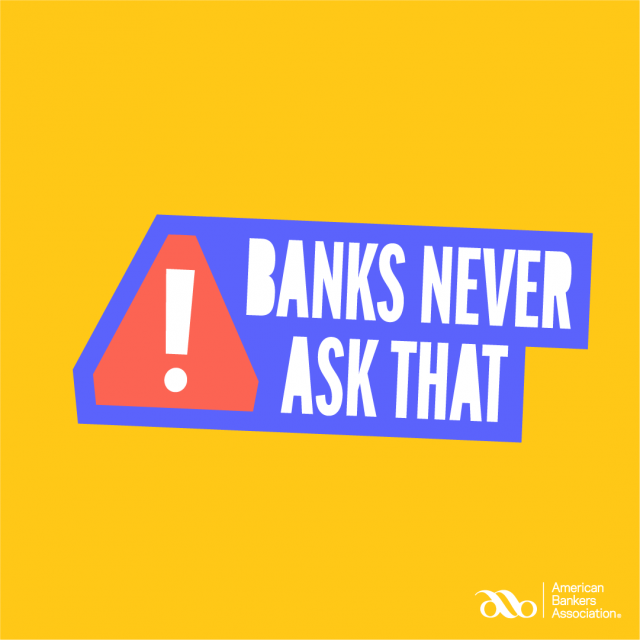Virginia Banks Share Tips to Protect Consumers During National Cybersecurity Awareness Month
#banksneveraskthat
The Federal Trade Commission (FTC) estimates that consumers lost $1.9 billion to phishing schemes and other fraud in 2019 and the ongoing pandemic has only increased the threat. For the month of October, Virginia banks are joining the Virginia Bankers Association (VBA), American Bankers Association and banks across the nation in launching a first-of-its-kind, industry-wide campaign to educate consumers about the persistent threat of phishing scams. To combat phishing, the #BanksNeverAskThat campaign uses attention-grabbing humor and other engaging content to empower consumers to identify bogus bank communications asking for sensitive information like their passwords and social security numbers.
“The banking industry is doing everything in its power to address a growing threat to customers,” said Bruce Whitehurst, VBA president and CEO. “Thanks to more than 1,500 participating banks around the country, we’re turning the tables on the bad guys by giving consumers the tools they need to spot illegitimate bank communications.”
As part of this campaign, Virginia banks offer the following tips and information for consumers:
To spot phishing scams, just remember “Banks Never Ask That.”
- If you receive an email, text, or phone call asking for confidential information, it’s a definite red flag. It’s better to be safe than sorry. End the call, delete the text, and trash the email, because banks never ask that!
- You may be asked to verify confidential information if you call your bank, but never the other way around. If you receive an incoming call from someone claiming to be your bank, the safest thing you can do is hang up and call your bank’s customer service number.
If you receive a suspicious email or text:
- Do not download any attachments in the message. Attachments may contain malware such as viruses, worms or spyware.
- Do not click links that appear in the message. Links in phishing messages direct you to fraudulent websites.
- Do not reply to the sender. Ignore any requests from the sender and do not call any phone numbers provided in the message.
- Report it. Help fight scammers by reporting them. Forward suspected phishing emails to the Anti-Phishing Working Group at reportphishing@apwg.org. If you got a phishing text message, forward it to SPAM (7726). Then, report the phishing attack to the FTC at ftc.gov/complaint.
If you receive a suspicious phone call:
- If you receive a phone call that seems to be a phishing attempt hang up or end the call. Be aware that area codes can be misleading. If your Caller ID displays a local area code, this does not guarantee that the caller is local.
- Do not respond to the caller’s requests. Financial institutions and legitimate companies will never call you to request your personal information. Never give personal information to the incoming caller.
If you feel you’ve been the victim of a scam and may have provided personal or important financial information, contact your bank immediately at their publicly listed customer service number. Often, this is found on the back of your bank card. Be sure to include any relevant details, such as whether the suspicious caller attempted to impersonate your bank and whether any personal or financial information was provided to the suspicious caller.
For more information about phishing scams and how to stop fraudsters in their tracks, Virginia banks encourage consumers to visit BanksNeverAskThat.com. On that website, consumers will find the #BanksNeverAskThat quiz, videos, phishing red flags, tips and FAQs.
###
About the Virginia Bankers Association
The Virginia Bankers Association represents banks of all sizes and charters and has served as the unified voice for Virginia’s $615 billion banking industry and its 42 thousand employees since 1893. To learn more about the VBA, click here.

